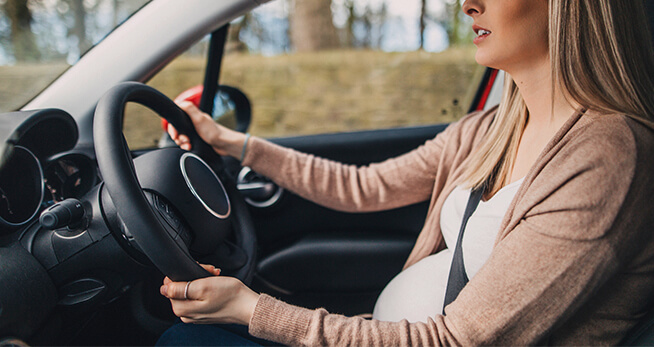What to Do After a Car Accident While Pregnant

Car accidents are always a frightening occurrence. For pregnant women, the fear multiplies exponentially due to the concern for the baby’s safety. The moments after a serious car accident are critical for a fetus’s health and, if you are pregnant, you should seek medical attention as soon as possible.
Risks to Pregnant Women in Car Accidents
Pregnant women have unique health requirements and car crashes can pose serious risks to an unborn child. Pregnancy complications can increase after a car accident and it is important that you visit your doctor or obstetrician to ensure that the baby is safe.
Car accidents can cause significant health problems for the mother and the baby, including:
- Miscarriage
- The development of a high-risk pregnancy
- Internal bleeding
- Early labor
- Hemorrhaging
- Birth defects
- Increased stress levels
- Emotional duress
One of the most unusual risks to pregnant women following a car accident is the effect of a mother’s stress and trauma on an unborn baby. Long-term mental anguish from birth complications or the accident itself can lead to additional complications and potential miscarriage.
Risks to Unborn Children During Car Accidents
Even if no physical harm comes to the baby, a fetus can suffer from severe injuries following a car crash in addition to the mother’s injuries.
- The baby can experience slower growth.
- The baby can go into fetal distress due to elevated stress levels.
- The baby can develop labor complications, leading to a difficult delivery that could result in death or injury.
- The fetus can experience contra-coup injury due to a quick stop. This causes a concussion or shock in the baby, causing potential rupture and further complications.
- The baby can develop conditions such as placenta problems, high blood pressure, or pre-eclampsia.
What to Do After a Car Accident While Pregnant
The moments after a car accident are critical to a baby’s health. If you suffer serious injuries in car accident, call 911 immediately. If you experience any of the following symptoms, you should visit the emergency room as soon as possible:
- Fluid leaking from the vagina
- Vaginal bleeding
- Unconsciousness
- Pain in the pelvis or belly
Another possible injury that can happen to pregnant women after a car accident is the umbilical cord bulging into the vagina. The umbilical cord provides necessary nutrients and oxygen to baby, so it is vital that you protect it. If you believe that you suffered this injury, crouch on your knees until your vagina is above your head. This will decrease pressure on the cord until emergency services arrive.
If you experience a minor car accident, such as a fender bender, and you are in the early stages of pregnancy, you likely did not suffer any serious injuries. However, you should visit a doctor to make sure the baby is still safe and healthy.
Keep Track of Your Symptoms and Visit a Doctor
Sometimes, the effects of a car accident on an unborn child are not clear until hours, days, or even months after the event. You should continue to monitor your symptoms until the baby is born. If you experience any of these symptoms after a car accident, visit your doctor immediately.
- Dizziness
- Severe, constant headaches
- A change in the baby’s movements
- Chills or fever
- Pain in the shoulder or abdomen
- Bleeding or spotting from the vagina
- Fluid leaking from the vagina
- Vomiting unrelated to morning sickness
- Painful or urgent urination
- Swelling in fingers or face
Understand Your Legal Options
If you suffered severe injuries during a car accident that resulted in the injury or death of your baby, you may pursue legal action. You can recover compensatory damages from either a personal injury lawsuit or an insurance claim. These funds can cover expenses such as medical expenses, pain and suffering, disability, and lost income, among other damages.
Taking immediate action to protect the fetus’s health is crucial after a car accident. With medical attention and symptom monitoring, you can keep your baby safe even after a traumatic crash.

